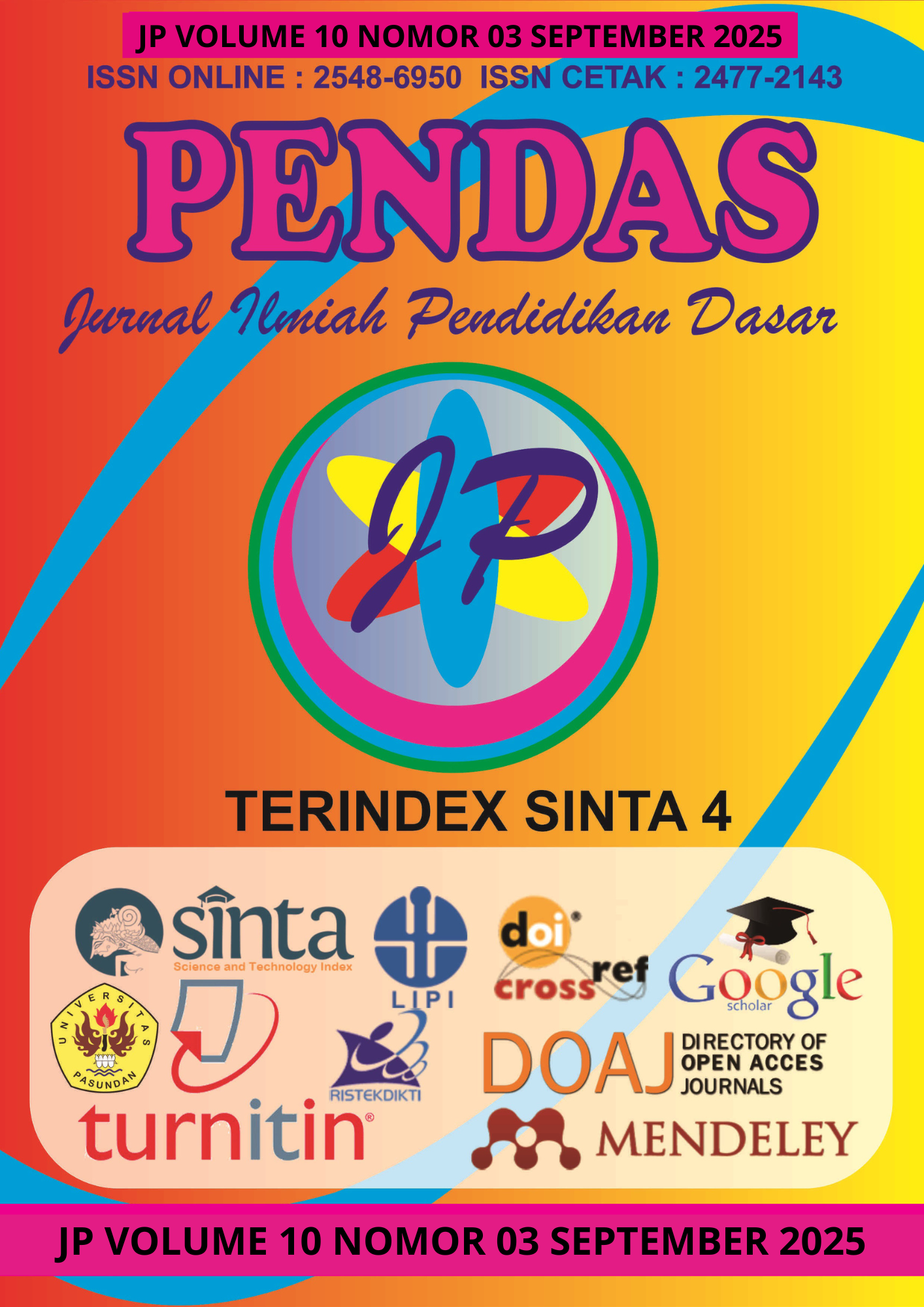ANALISIS PENDIDIKAN KARAKTER PEDULI SOSIAL DALAM PEMBELAJARAN IPAS MATERI “DISINI TEMPAT TINGGALKU” KELAS IV SD NEGERI NGEMPLAK SURAKARTA TAHUN AJARAN 2024/2025
DOI:
https://doi.org/10.23969/jp.v10i3.33571Keywords:
character, social care, IPASAbstract
Character education plays an important role in shaping a generation that is not only intellectually smart but also empathetic and caring toward others. One of the core values that should be instilled early on is social care. This study aims to describe the implementation strategies, behavioral indicators, and forms of value integration of social care character education in IPAS learning on the topic “This Is My Place of Residence” in Grade IV of SD Negeri Ngemplak Surakarta for the 2024/2025 academic year. A descriptive qualitative approach was used, with data collected through observation, interviews, and documentation. Data validity was ensured through source and technique triangulation. The results show that the implementation of social care values is carried out through routine activities such as greetings and donations, spontaneous actions like giving praise or reprimands, teacher role modeling, and a school environment that fosters caring behavior. Indicators of students’ social care are reflected in their habits of sharing food, helping peers, and respecting school staff. Social care values are integrated into IPAS learning using a contextual approach that links the content to students' surrounding environment. In conclusion, the implementation strategies of social care character education are quite effective in fostering students’ caring attitudes, and IPAS learning serves as a relevant and contextual medium to internalize these values.
Downloads
References
Alma, B. (2010). Pendidikan kewirausahaan. Bandung: Alfabeta.
Handini, O. (2021). Pengembangan model pembelajaran scientific collaboration (SCICOLLA) pada pembelajaran tematik integratif sekolah dasar di Kota Surakarta untuk meningkatkan prestasi belajar [Tesis, Universitas Sebelas Maret].
Handini, O., & Soekirno, S. (2019). Intensitas pembelajaran tematik integratif melalui pendekatan saintifik di SD Kestalan Surakarta. Widya Wacana, 14(1), 58–62.
Hasanah, S., & Fauzi, A. (2020). Pendidikan karakter di sekolah dasar berbasis lingkungan. Jurnal Pendidikan Karakter, 10(1), 58–70.
Kemendiknas. (2011). Pedoman pelaksanaan pendidikan karakter. Jakarta: Kementerian Pendidikan Nasional.
Kusuma, H. A., & Nugroho, A. (2021). Efektivitas pembelajaran kontekstual terhadap sikap sosial siswa. Jurnal Penelitian Pendidikan, 28(2), 105–115.
Miles, M. B., & Huberman, A. M. (2014). Qualitative data analysis: A methods sourcebook (3rd ed.). Thousand Oaks, CA: SAGE Publications.
Narwanti, F. (2016). Pembelajaran berbasis nilai dalam membentuk karakter sosial siswa sekolah dasar. Jurnal Pendidikan Dasar, 7(1), 34–42.
Ramdani, R., & Ambarwati, D. (2021). Nilai sosial dalam pendidikan dasar: Tinjauan sosiopedagogik. Jurnal Ilmiah Sekolah Dasar, 5(2), 79–89. https://doi.org/10.23887/jisd.v5i2.34899
Sari, R. P., & Putra, Y. (2020). Pendidikan karakter dalam kurikulum merdeka belajar.
Setiawan, A., & Prasetyo, D. (2021). Kegiatan pembiasaan dalam membentuk karakter siswa sekolah dasar. Jurnal Pendidikan Dasar Nusantara, 6(1), 33–42.
Trisiana, A. (2015). The development strategy of citizenship education in civic education using the citizen model project in Indonesia. Journal of Psychological and Educational Research (JPER), 23(2), 111–124.
Trisiana, A. (2019). Innovation design development of citizenship education models on the characters of Indonesian communities in the digital media era and technology revolution. International Journal of Recent Technology and Engineering (IJRTE), 8(2), 322–328.
Trisiana, A. (2020). Digital literacy models for character education in the globalization era. Humanities & Social Sciences Reviews, 8(1), 522–531. https://doi.org/10.18510/hssr.2020.8164
Trisiana, A., et al. (2020). The challenges of character education: Mental revolution policy in the development of citizenship education in higher education. International Journal of Psychosocial Rehabilitation, 24(8), 2340–2353.
Trisiana, A. (2020). Strengthening citizenship learning through digitalization of learning media. PPKn Journal, 10(2).
Trisiana, A., Priyanto, A., & Sutoyo, S. (2024). Analysis of developing anti-corruption education in Indonesia through media-based citizenship education learning smart mobile civic. Jurnal Cakrawala Pendidikan, 43(1), 166–175. https://doi.org/10.21831/cp.v43i1.60261
Trisiana, A., Sugiaryo, & Rispantyo. (2022). Upaya meningkatkan karakter tanggung jawab melalui pembiasaan pada peserta didik kelas I SD Negeri Kragilan tahun 2021/2022. Jurnal on Education, 5(1), 1088–1094.
Trisiana, A., Wahyuni, D., & Yusuf. (2024). Analisis penerapan nilai pendidikan karakter peduli sosial terhadap sikap kerjasama dan gotong royong pada organisasi siswa intra sekolah Madrasah Aliyah Negeri 1 Surakarta tahun 2023/2024. Jurnal Global Citizen, 13(1). Universitas Slamet Riyadi.
Utami, R. D., & Kurniawan, B. (2022). Peran guru dalam pembelajaran karakter kontekstual pada siswa kelas IV. Jurnal Ilmu Pendidikan Dasar, 4(1), 12–19.
Wibowo. (2013). Manajemen pendidikan karakter di sekolah. Yogyakarta: Pustaka Pelajar.
Yulianti, D., & Hidayat, A. (2020). Integrasi pendidikan karakter dalam pembelajaran tematik SD. Jurnal Pendidikan dan Pengajaran, 53(3), 218–230.
Downloads
Published
Issue
Section
License
Copyright (c) 2025 Pendas : Jurnal Ilmiah Pendidikan Dasar

This work is licensed under a Creative Commons Attribution 4.0 International License.














































